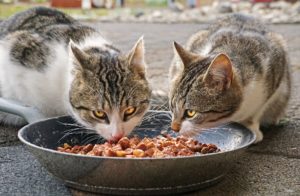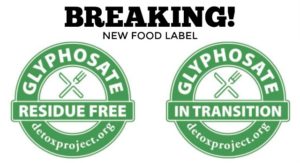The Truth About Glyphosate Exposure & Pet Food

You’ve probably heard the word glyphosate by now, especially if you’re familiar with the popular herbicide Round Up. It’s frightening how toxic this popular weed killer is. In the recent weeks I’ve come across a few cat clients where glyphosate resonates as a stressor to their health which is very concerning. When diving in to take a deeper look I found some very disturbing facts about glyphosate exposure that pet parents need to know.
Health risks associated with glyphosate
The International Agency for Research on Cancer (IARC) has concluded that glyphosate has the potential to cause cancer. Studies have now linked glyphosate to non-Hodgkins lymphoma, non-alcoholic fatty liver disease, IBD, endocrine and reproductive disorders. This is hardly surprising when you realize that glyphosate has indeed permeated our food supply. The vast majority of corn, wheat, soybeans, sugar beets and imported rice are genetically modified and sprayed with Round Up. Conventional crops like oats and lentils are commonly sprayed with Round Up before harvesting to dry them out faster. Unbeknownst to pet owners, these products commonly end up in pet foods either directly as ingredients or indirectly through the bioaccumulation in the tissues of animals who were fed these ingredients.

Glyphosate detected in pet foods
What surprised me the most recently was something I learned in an article written by Dr. Jean Dodds, DVM. She discusses two studies concerning glyphosate and pet food. The first study was done by Cornell University when they tested 18 different pet foods. The results were stunning:
- Glyphosate was detected in every product.
- The concentration of glyphosate concentration was correlated with crude fiber content. Meaning, it is a strong likelihood that the glyphosate came from a plant product.
- The average daily intake of the glyphosate from all products combined was estimated to result in exposures that were 0.68–2.5% of that for humans in the United States and European Union.
- However, the most contaminated pet food would result in glyphosate exposure that was 7.3% and 25% above the average daily intake for humans.
- Overall, commercial companion pet foods have so much glyphosate, that pet exposure is 4–12 times higher than of humans on a per kilogram basis.
Kibble and grain free foods are not risk-free
The second study was a more comprehensive study made by the Health Research Institute Laboratories measuring the levels of glyphosate found in pet urine samples.
- Cats are averaging 8 ppb which is 16 times more than that found in the average of human urine.
- Dogs are averaging 15.8 ppb which is 32 times the human average.
- Dogs that eat raw food have virtually no detectable glyphosate.
- Those that eat canned food have more.
- Pets that eat dry kibble have higher levels.
- Those that eat grain-free kibble have the highest levels. It is believed that the movement to grain-free diets using ingredients such as oats, pea protein, chick peas and lentils may be a cause.
- The researchers have tested crops like oats and legumes and they deliver the highest glyphosate levels to human consumers.
Due to the grain-free pet food movement in recent years manufacturers are replacing grains with peas, lentils, garbanzo beans, pea protein, etc. Unknowingly many pet parents may be exposing their pets to even greater amounts of glyphosate based on the research above.
Ingredients in human and pet food that commonly contain glyphosate
An article by Weedkillercrises.com gives a very detailed list of many common foods that contain glyphosate. If you take a close look at the labels, pet food manufacturers source these same ingredients for many of their products.
- Non-organic cereals and grains that are harvested with glyphosate. These include wheat, barley, buckwheat, millet, rice, oats, wild rice, popcorn, and sorghum.
- The major GMO foods, such as soy, corn, and canola.
- Additives including corn syrup, maltodextrin, fructose, baking powder, natural flavors, and cornstarch.
- Non-organic canola oil.
All prepared foods such as bread, muffins, crackers, cookies, and snacks. - Pastries, bars, sugar, cane sugar, beet sugar, corn sugar, chewing gum, and high fructose corn syrup.
- Non-organic fruits and vegetables including papaya, summer squash, zucchini, potatoes, apples, oranges, lentils, beans, peppermint, peas, spearmint, instant tea and spices.
- Animal foods including alfalfa, corn, hay, fodder and soy, as well as poultry, dairy, and eggs.
- Common prepared foods that have glyphosate in them include potato chips, corn chips, multigrain chips, soy sauce, soy milk, rice milk, almond milk, corn tortillas, olive oil, and most canned fish in oil.
- Some nuts, such as almonds and sunflower seeds, may also contain glyphosate.
- Be on the lookout for foods that are only labeled organic; they may legally contain up to 5% non-organic ingredients. Instead, look for prepared foods with the 100% organic label.

Reducing exposure to glyphosate
Even though it’s likely impossible to completely avoid glyphosate exposure, there are ways to reduce it.
-
- Avoid processed diets like kibble
- When buying canned pet food make sure it’s free of corn, wheat, soy, oats, rice and legumes
- Use non-toxic herbicides and weed killers on lawns, flower beds, and landscaping
- Look for certification labels such as Non-GMO Verified AND The Detox Project’s Glyphosate Residue Free
- Buy organic foods as much as possible
Beneficial supplements and herbs
Fortunately, there are several things we can do as pet parents to help our pets stay healthy and protect them from the effects of glyphosate. The first thing I recommend is using a liver support product.
Because the liver is the primary organ of detoxification in your pet’s body,” Dr. Karen Becker, DVM, recommends the following herbs that assist in liver function and detoxification: burdock root, dandelion root, licorice, Oregon grape, yellow dock, and milk thistle. Milk thistle not only helps detoxify the liver, it stimulates regeneration of liver cells. Another vital liver nutrient is the detoxifier SAMe (S-adenosyl-methionine).
The second thing is to support the microbiome with a high quality probiotic. Glyphosate kills the beneficial bacteria in the gut; therefore, regular supplementation can help restore optimal balance. A probiotic with multiple strains rather than just a single one is best.
Finally, while it may be impossible to avoid glyphosate entirely due to how prevalent its use has become around the world, taking mindful steps to reduce exposure and support the body’s function is necessary.
Want to learn more about interpreting your pet food label? Check out this first article in a 3 part series.


